Diatomic compounds - Study guides, Class notes & Summaries
Looking for the best study guides, study notes and summaries about Diatomic compounds? On this page you'll find 249 study documents about Diatomic compounds.
All 249 results
Sort by

-
Test Bank For Foundations of College Chemistry 14th Edition Hein
- Exam (elaborations) • 660 pages • 2023
-
- $29.98
- 1x sold
- + learn more
Package Title: Hein Test Bank Course Title: Hein 14e Chapter Number: 3 Question type: Multiple Choice 1) All matter is composed of elements. Approximately how many elements are there? a) 4 b) 10 c) 68 d) 100 Answer: D Difficulty: easy Learning Objective 1: Define an element and write the chemical symbol for an element when given its name. Section Reference 1: Section 3.1 2) The smallest particle of an element that can exist is called a(n) ___. a) atom b) ferrul...

-
General Chemistry placement test Study Guide 2024 Solved 100%
- Exam (elaborations) • 15 pages • 2024
- Available in package deal
-
- $12.49
- + learn more
Atomic Number - The number of protons in the nucleus of an atom. The atomic number of an element never changes, meaning that the number of protons in the nucleus of every atom in an element is always the same. Hydrogen = 1, Carbon = 6, Oxygen = 8 (located on top of element of periodic table) Mass Number - # of neurons + # of protons = mass number (located on bottom of periodic table) Isotopes - Let's say an atom is missing a neutron or has an extra neutron. That type of at...
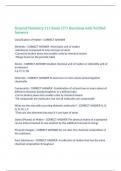
-
General Chemistry 111 Exam 1|71 Questions with Verified Answers,100% CORRECT
- Exam (elaborations) • 7 pages • 2024
-
- $15.99
- + learn more
General Chemistry 111 Exam 1|71 Questions with Verified Answers Classification of Matter - CORRECT ANSWER Elements - CORRECT ANSWER -Most basic unit of matter -Substances composed of only one type of atom -Cannot be broken down into smaller units by chemical means -Things found on the periodic table Atoms - CORRECT ANSWER Smallest chemical unit of matter or indivisible unit of an element e.g. H, O, Na Molecule - CORRECT ANSWER At least two or more atoms joined together chemicall...
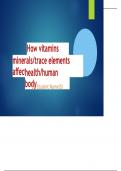
-
CHEM 120 Week 5 Assignment; Topic Approval
- Other • 18 pages • 2023
- Available in package deal
-
- $18.48
- + learn more
Week 5 Assignment: Topic Approval Week 8 Assignment Requirements Instructions: Students will work in groups of 2-3 students. Working as a group, students will pick a topic based on course outcomes (COs), research that topic for its connection to nursing/health care. Students may pick a topic from the suggested topics list or instructors may choose to assign specific topics to students. Additionally, students may choose a different topic that is relevant to the COs as long as the faculty approv...
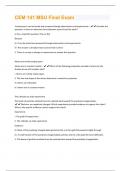
-
CEM 141 MSU Final Exam All Possible Questions and Answers with complete solution
- Exam (elaborations) • 11 pages • 2023
- Available in package deal
-
- $7.99
- + learn more
Yes because it can be tested and answered though observations and experiments - Consider the question: Is there an attractive force between a pencil and the earth? Is this a scientific question? [Yes or No] Because III. It can be tested and answered through observations and experiments IV. The answer is already known and we find it online V. There is no way to design an experiment to answer this question. Atoms are mostly empty space Atoms are in constant motion - Which of the following ...
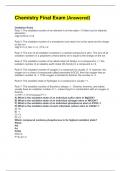
-
Chemistry Final Exam (Answered)
- Exam (elaborations) • 34 pages • 2023
-
- $13.49
- + learn more
Chemistry Final Exam (Answered) Oxidation Rules Rule 1: The oxidation number of an element in its free state = 0 (Also true for diatomic elements) -Mg=0,H2=0, C=0 Rule 2: The oxidation number of a monatomic (one-atom) ion is the same as the charge on the ion -Mg^2+=+2, Na^+=+1, O^2-=-2 Rule 3: The sum of all oxidation numbers in a neutral compound is zero. The sum of all oxidation numbers in a polyatomic (many-atom) ion is equal to the charge on the ion. Rule 4: The oxidation numb...
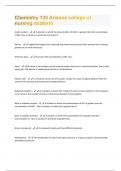
-
Chemistry 130 Arizona college of nursing midterm Questions With 100% Correct Answers.
- Exam (elaborations) • 11 pages • 2024
- Available in package deal
-
- $7.99
- + learn more
Acidic solution - A solution in which the concentration of H3O+ is greater than the concentration of OH- Also, a solution in which pH is less than 7. Anions - negatively-charged ions (meaning they have more electrons than protons due to having gained one or more electrons). Arrhenius base - increases the concentration of OH- ions. Atom - An atom is the smallest unit of ordinary matter that forms a chemical element. Every solid, liquid, gas, and plasma is composed of neutral or ionized atom...
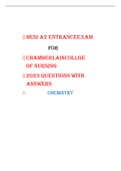
-
HESI A2 CHEMISTRY-CHRISJAY FILES (1) (1)
- Exam (elaborations) • 54 pages • 2023
-
- $14.99
- 1x sold
- + learn more
HESI A2 ENTRANCEEXAM FOR CHAMBERLAINCOLLGE OF NURSING 2023 QUESTIONS WITH ANSWERS CHEMISTRY HESI A2 CHEMISTRY V1/V2 FILE 1. If a Hydrogen isin a compound, what would its oxidation number be? +1 2. What isthe oxidation number of any simple ion? +1 or -1 depending on the charge of the ion 3. How many kilograms are in a pound? 0. kg 4. What is the temperature for freezing point of water in Celsius? 0 degrees Celsius (32°F for Fahrenheit) 5. What is the conversion of Celsius to Fah...
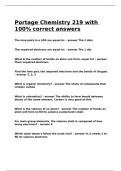
-
Portage Chemistry 219 with 100% correct answers
- Exam (elaborations) • 6 pages • 2024
-
- $12.99
- + learn more
The lone pairs in a LDD are equal to: The 2 dots The unpaired electrons are equal to: The 1 dot 0:02 / 0:30 What is the number of bonds an atom can form, equal to? Their unpaired electrons Find the lone pair, the unpaired electrons and the bonds of Oxygen. 2, 2, 2 What is organic chemistry? The study of compounds that contain carbon What is catenation? The ability to form bonds between atoms of the same element. Carbon is very good at this. Wh...
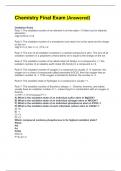
-
Chemistry Final Exam (Answered)
- Exam (elaborations) • 34 pages • 2023
-
- $12.49
- + learn more
Chemistry Final Exam (Answered) Oxidation Rules Rule 1: The oxidation number of an element in its free state = 0 (Also true for diatomic elements) -Mg=0,H2=0, C=0 Rule 2: The oxidation number of a monatomic (one-atom) ion is the same as the charge on the ion -Mg^2+=+2, Na^+=+1, O^2-=-2 Rule 3: The sum of all oxidation numbers in a neutral compound is zero. The sum of all oxidation numbers in a polyatomic (many-atom) ion is equal to the charge on the ion. Rule 4: The oxidation numb...

How did he do that? By selling his study resources on Stuvia. Try it yourself! Discover all about earning on Stuvia


